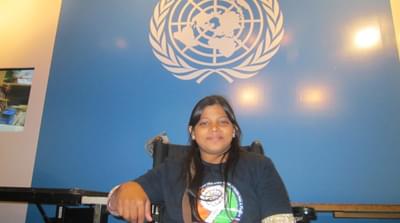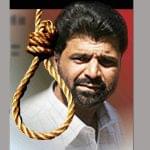Communities Stories
Rekha Calls for the “World We Want”

At a first glance Rekha seems to be just another young woman with special needs. But on the other note she is a twenty two year old with special powers. She has been on a wheel chair since she was two but today she stands tall with her “World We Want” campaign for special rights for children living with disabilities across the globe. She headed the campaign with her eleven member team of children that presented ‘Children’s Manifesto’ asking for equal opportunities and greater sensitivity towards people like her at the 68th United Nations General Assembly in New York in the first week of October. This is the first ever such a call asking for the attention of the indifferent World leaders towards an issue that has kept a section of the world population living in oblivion.
Rekha’s call is based on her own experiences. On her way to the United Nations General Assembly Rekha recalled all the hiccups of her growing up years as a disabled child. “Honestly I just felt I was differently abled”, but I know how difficult it was for my little sister who would carry me to school. Sometimes she fell ill too and I would have to miss school because I could not walk. The school dropped me because I needed help to go to the toilet or drink water”, she ruefully adds.
Rekha Kumari, the daughter of a watchman of Delhi is waiting for her class XI results now at the age of twenty two. Surviving on her monthly government stipend for children living with disabilities (CWD)she says “As if we did not exist. Despite having dropped out of school at eleven, I rejoined with more grit and determination. I got into a wheel chair but couldn’t drive toschool because the roads were not smooth for an easy drive. There were no toilets for people like me but I have decided to fight through”. “Unless I fight for the cause of people like me, I will always remain non- existent”, she explains.
As the National Convener for National Forum of Children with Disabilities (NFCD), the global movement of Children with Disabilities (CWDs), she is now bringing together children who are differently abled and a little not amongst the equals from across the world asking for adequate space and equal rights for them. Considered to be the first of its kind initiative across the world that joins children with special needs, Rekha is advocating the cause for equal opportunity for children’s education and development. The Children Manifesto at the United Nations talk of a world where ‘Rights were real and not mere promises’. Children with disabilities were entitled to a disability certificate, a safe childhood and a barrier free environment’.
International NGO World Vision has facilitated the movement and supporting the cause of building the network for a stronger voice of the movement in partnership with other Civil Society Organization across the globe. Reni Jacob, Director Advocacy of World Vision says “Children are usually unseen and unheard. The plight of the children increases with gender and disability and a disable girl child is three times more vulnerable towards discrimination.The movement of children with disability is an effort to make themselves seen and their voice heard at the tables where policies are made.”
The story of Chinar Poddar, a seven year old who was given the option of either being detained or leave the school after she could not compete with her “able classmates” in a prominent school of Kolkata is another common instance of discrimination against children with disabilities. The reason cited was that she needed care and additional support to cope to the everyday pressures of the school. Yet her parents argue that had she be given equal opportunity and had the school provided an integrated environment, she would not have been discriminated in this way.
Dr. MehnazWarsi, Director of PremOAsha a local NGO in Kolkata working with the rehabilitation of vulnerable children says”, “The idea is to raise issues that people have been overlooking in the cases of children with disabilities. As per our data more than ninety percent of children with disabilities from middle income group homes drop out of mainstream schools because they cannot cope to pressures and there are very few schools sensitive towards children with disabilities. Trivial issues as availability of toilets, or providing a little support are reasons for discrimination”.
According to National Sample Survey Officer (NSSO) it is reported that 55% of people with disability in India were illiterate whereas the share of children with disability out of school is five and a half time higher than the general rate of drop outs. But the most alarming data shows that only 9% of the disabled people have completed education upto secondary level and above and out of 1000 people with disability only 15-35 have completed any vocational course. About 11% of the children with disability in the age group 5-18 years were enrolled in special schools in urban areas as compared to less than 1% in rural areas.
And this challenge makes Rekha and her campaign all the more important particularly, in a country where children are asking for a gross expenditure of just nine percent of the GDP towards issues of child education and health. Government study shows every seventeen seconds an India child below the age of five dies of simple curable childhood diseases. And those who could live with disabilities havelittle or no options to survive just like Rekha or her counterpart Nisha Das who was borne with deformed limbs. “All your life you live with the sympathy what others show towards you. I want a life of dignity for what I am and not for what I am incapable of.”
Today Rekha and Nisha are living with the cause of the children with special needs said to be the most vulnerable in society.They are advocating and creating awareness for an inclusive child development policy.As the National Convener for NFCD, Rekha is participating in many forums and consultations to raise voice for Children with Disabilities. Rekhaat the UN Conference had said,” “During rainy season I cannot make it to school on time by myself. In such instances I am accused of not abiding by the rules. When I go to hospital I am last in the queue and sometimes I do not get treated. We children with disabilities have rights, when will the world finally understand that?”
Similar were voices from across the globe. A blind Marathon world-record-holder Henry Wanyoike from Kenya reinforced the sentiment: “No one believed in me when I wanted to break world records after becoming blind, sometimes even I myself lost faith. But: “We are very able, when we are given an opportunity! Disability is not Inability…”
Eleven other children from India who happened to be part of the great campaignat the UN stood beside Rekhaconcerned at the indifference of the policy makers towards them. Not all of them where children with disabilities yet together they stood cementing the bridge by being just children or youth, calling for a concrete educational, health and development policy.
In her foresightedness Rekha assures of a very sensitive country. She says, “I dream of my India which is inclusive, an India which is sensitive to the needs and aspirations of special children, an India which will hear and amplify the voices of children and an India which will keep children central in all its policies and decisions”.
Published in Communities Stories
